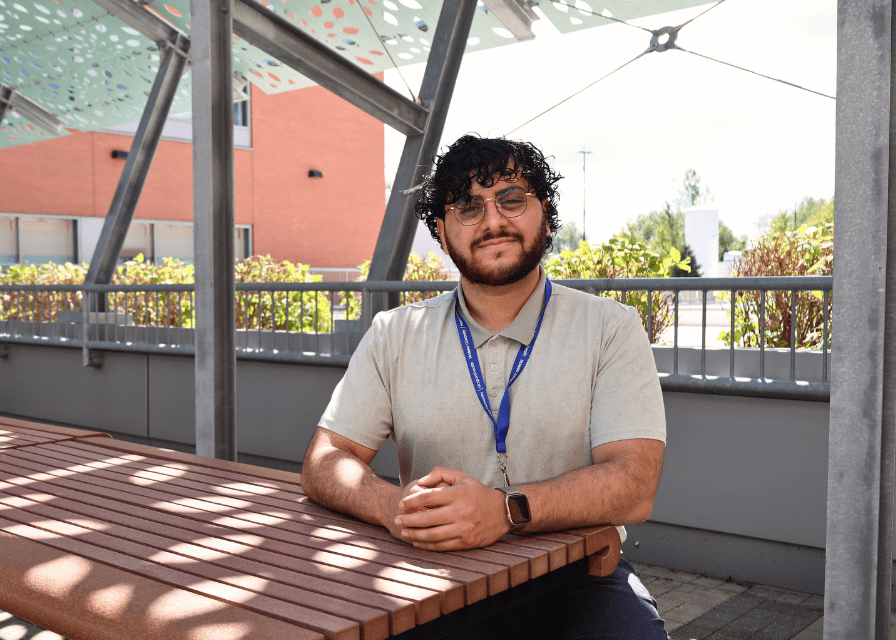The first time Amr Almasri was told to walk into a patient's room alone, he hesitated.
“It felt like I had 100 checkboxes running through my head,” he says. “What do I ask first? How do I make sure they’re comfortable? What if I forget something?”
That was last year. Now, he’s the one volunteering to follow up with patients after surgery, eager to hear how they’re doing and what’s changed since he last saw them.
This shift in confidence, he says, has everything to do with the experiences he’s had during his first year at McMaster University’s Michael G. DeGroote School of Medicine – Niagara Regional Campus (NRC).

Niagara has been the smallest city Amr Almasri has ever lived in, and he's grown to love its community feel.
Through NRC’s pre-clerkship rotations, Almasri has explored orthopedics and plastic surgery at the Marotta Family and Welland hospitals and orthopedics at McMaster University Medical Centre.
These early clinical experiences – a hallmark of NRC’s approach – give students the chance to develop their skills alongside experienced physicians from the start of their training.
In Welland, Almasri stood alongside plastic surgeon Dr. Jouseph Barkho, assisting in procedures that restore movement, ease pain and rebuild lives. Orthopedic surgeon Dr. Prateek Goyal coached him through surgical techniques. And on a cardiology shadowing day, Dr. Adnan Hameed pulled him aside to break down how to read an EKG – turning a complex skill into something approachable.
“They don’t just let you watch from the corner,” Almasri says. “They involve you. That’s huge when you’re starting out.”
“They (doctors) don’t just let you watch from the corner. They involve you. That’s huge when you’re starting out.”
A close-knit campus community
With just 30 students in his cohort, Almasri says NRC feels less like a class and more like a team. The smaller class size means more one-on-one time with faculty, personalized feedback and a supportive peer group working together to succeed.
Study sessions are as common as potlucks, and classmates are quick to share notes or explain a tricky concept.
“There’s no cutthroat competition,” he says. “If someone’s struggling, people step in. We all want each other to succeed.”
That supportive culture extends to the hospital. Staff and physicians at Niagara Health are known for creating welcoming learning environments and making sure medical students feel valued as part of the care team.
Outside of class and rotations, Almasri relies on cooking and friendships to keep him grounded.
“Whether it’s matcha brownies or strawberry shortcake for our end-of-year celebration, cooking has been my way of decompressing after long days,” he says.
His classmates have also been key to keeping morale high, checking in on each other after long days on their feet.
Research and innovation
In addition to his work, Almasri has kept busy with research projects.
He’s working with Dr. Barkho and other McMaster physicians on studies, while also building out CasPrep.net, an online tool he created to help prospective students prepare for the Casper exam.
“With all of this, having that support network NRC provides is instrumental,” he says. “Being there for each other is more important than ever.”
“You learn medicine here, but you also learn how to be the person patients can trust. That’s just as important.”
Looking forward
As clerkship approaches, Almasri is focused on building the problem-solving skills that define great physicians – the ability to listen, assess and plan next steps.
“It’s like watching a resident connect the dots in real time,” he says. “I want to get to that level where you can take a few details and build the whole picture.”
For now, he’s keeping both orthopedics and reconstructive plastic surgery on the table. Whichever path he chooses, he says NRC has given him more than a foundation in medicine – it's given him the confidence, mentorship and a community that will carry him through his career.
“You learn medicine here, but you also learn how to be the person patients can trust. That’s just as important.”

